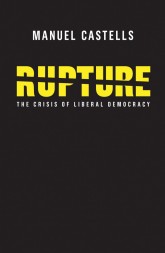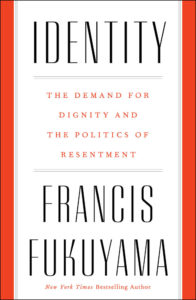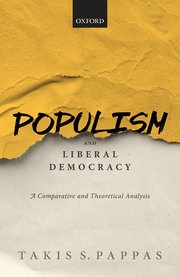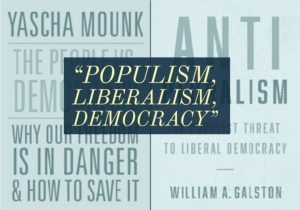Robert Kagan is “dead wrong” to contend that the greatest threat to Western liberal democracies is the ascendancy of authoritarianism, argues Harlan Ullman, a senior adviser at the Atlantic Council. The failure of Western governments to govern far exceeds what is an exaggerated view of the rise of authoritarianism in realizing what threatens us most. It is broken government, he writes for the Washington Post.
“The greater tragedy for the West is that no righting movement to correct broken government has materialized. China and Russia also have internal problems,” adds Ullman, author of Anatomy of Failure: Why America Loses Every War It Starts. “But until our respective publics demand good government and hold elected leaders accountable, authoritarianism will appear to be winning when it is not.”
 Political institutions have failed to keep up with technological shifts, argues Manuell Castells. Consequently, the nation-state is defined by a tension between “acting as a node within the global networks, where the fate of its people are decided, and in representing its citizens who refuse to give up on their historical, geographical and cultural roots, or to lose control over their work.” In Castells’s latest book, Rupture: The Crisis of Liberal Democracy (Polity), the optimal situation he envisions is a liberal democracy with well-established and reasonably effective political institutions headed up by a credible system of electoral representation, notes analyst Scott McLemee.
Political institutions have failed to keep up with technological shifts, argues Manuell Castells. Consequently, the nation-state is defined by a tension between “acting as a node within the global networks, where the fate of its people are decided, and in representing its citizens who refuse to give up on their historical, geographical and cultural roots, or to lose control over their work.” In Castells’s latest book, Rupture: The Crisis of Liberal Democracy (Polity), the optimal situation he envisions is a liberal democracy with well-established and reasonably effective political institutions headed up by a credible system of electoral representation, notes analyst Scott McLemee.
 Stanford University’s Francis Fukuyama asks whether Western liberal democracy can survive identity politics. He joins The Agenda (above) to discuss his new book, “Identity: The Demand for Dignity and the Politics of Resentment.”
Stanford University’s Francis Fukuyama asks whether Western liberal democracy can survive identity politics. He joins The Agenda (above) to discuss his new book, “Identity: The Demand for Dignity and the Politics of Resentment.”
Rhetoric assailing “whiteness” and masculinity can lend seeming credence to white-nationalist claims that whites and men are under assault. And vilifying the liberal order as racist, sexist and oppressive is hardly a way to bolster the defense of liberalism against threats from the right, analyst Cathy Young writes for the Washington Post:
If the present rise of authoritarian populism merely marks, as a writer in the Nation puts it, “a moment when liberal democracy’s violent and racist tendencies have been unmasked,” why should ordinary citizens believe that the hypocritical mask is worth saving?
 Takis S. Pappas, author of Populism and Liberal Democracy: A Comparative and Theoretical Analysis, questions the common practice of lumping together as “populist” the various to democracy.
Takis S. Pappas, author of Populism and Liberal Democracy: A Comparative and Theoretical Analysis, questions the common practice of lumping together as “populist” the various to democracy.
In a recent article for the National Endowment for Democracy’s Journal of Democracy, he disaggregates such challengers into three analytically distinct categories: antidemocrats, nativists, and populists. He shows that the gravest threat to contemporary liberalism comes from populist rather than from antidemocratic or nativist parties. Pappas identified ten specific characteristics, or conditions, which set a clear boundary line between nativists and populists:
- Ideologically, nativist parties stand invariably on the conservative right, battling to conserve their countries’ ethno-cultural identity, which they believe is threatened by modernity itself. …
- Programmatically, the nativists’ appeal is based on specific right-wing conservative policy packages, specifically about anti-immigration policies and how to thwart further EU integration. …
- Ideationally, nativists discard the populist idea that society is ostensibly divided between ‘the people’ and some elite. Instead, they conceive their respective societies as culturally unified wholes (communities of native autochthons), whose unity is threatened by alien heterochthons, such as Muslims, illiberal Eastern Europeans or poor Southerners.
- Rhetorically, nativists are not generally intent on using a socially and politically polarising discourse. Unlike populists, who exploit accumulated social resentment from economic inequality, political exclusion and social injustice to generate polarisation, nativist parties stick for the most part to their programme and, in general, refrain from causing extra adversity among natives.
- Electorally, impeded as they are by liberal conservative forces, the nativists find it impossible to win electoral majorities and govern singlehandedly. …
 Existentially, being the programmatic parties that they are, the nativists’ fate is intricately linked with the specific policies they espouse. There are two possibilities: if their policy programmes are achieved (as with anti-EU UKIP and the 2016 Brexit referendum), they are bound to disappear; if their programmes pertain to ongoing political issues, their fortunes will depend on developments related to such issues.
Existentially, being the programmatic parties that they are, the nativists’ fate is intricately linked with the specific policies they espouse. There are two possibilities: if their policy programmes are achieved (as with anti-EU UKIP and the 2016 Brexit referendum), they are bound to disappear; if their programmes pertain to ongoing political issues, their fortunes will depend on developments related to such issues.- Prospectively, nativist parties do not tend to promise redemption – in the form of social justice, economic equality, the people’s sovereignty or national independence from the EU. …
- Organisationally, nativist parties are distinguished by their relatively weak – and certainly non-charismatic – leadership, factional conflicts and even open infighting. …
- Emblematically, almost all nativist parties are led by members of their respective societies’ elites…
- Psephologically, as shown by the comparative study of trends in voting, the foremost characteristic uniting all nativist parties in a statistically significant way is their negative stance against immigration. No such specific characteristic, or group of characteristics has so far been detected in the study of populist parties.







